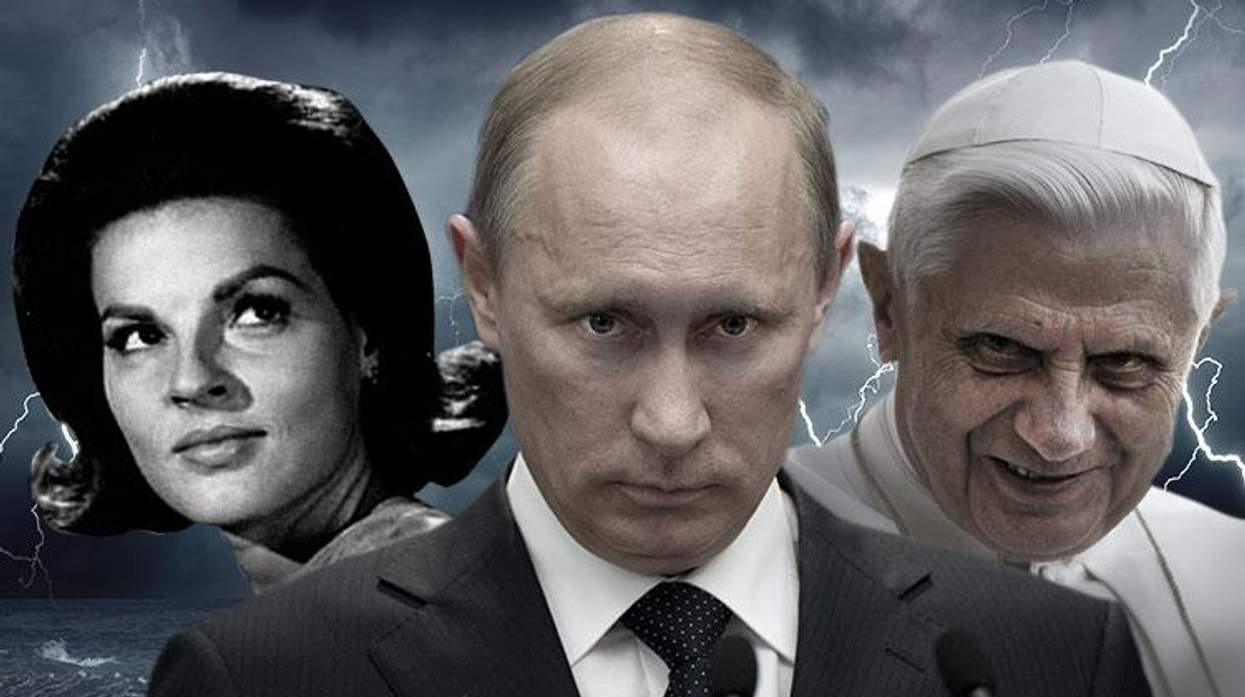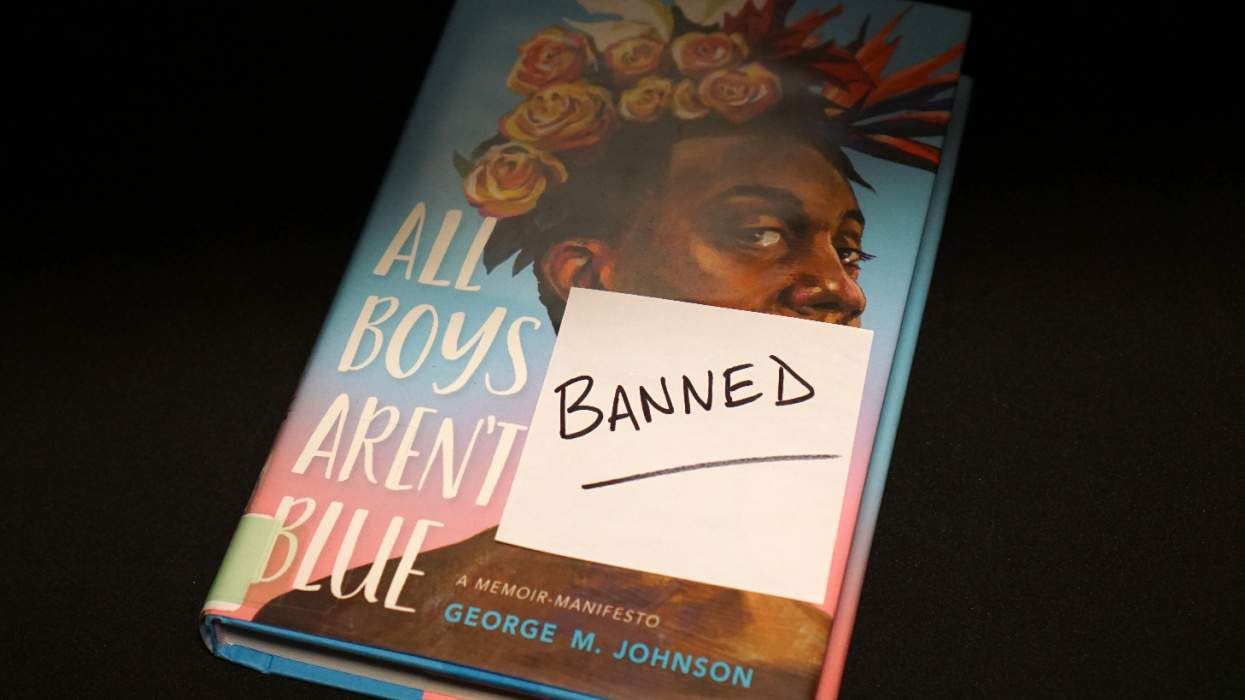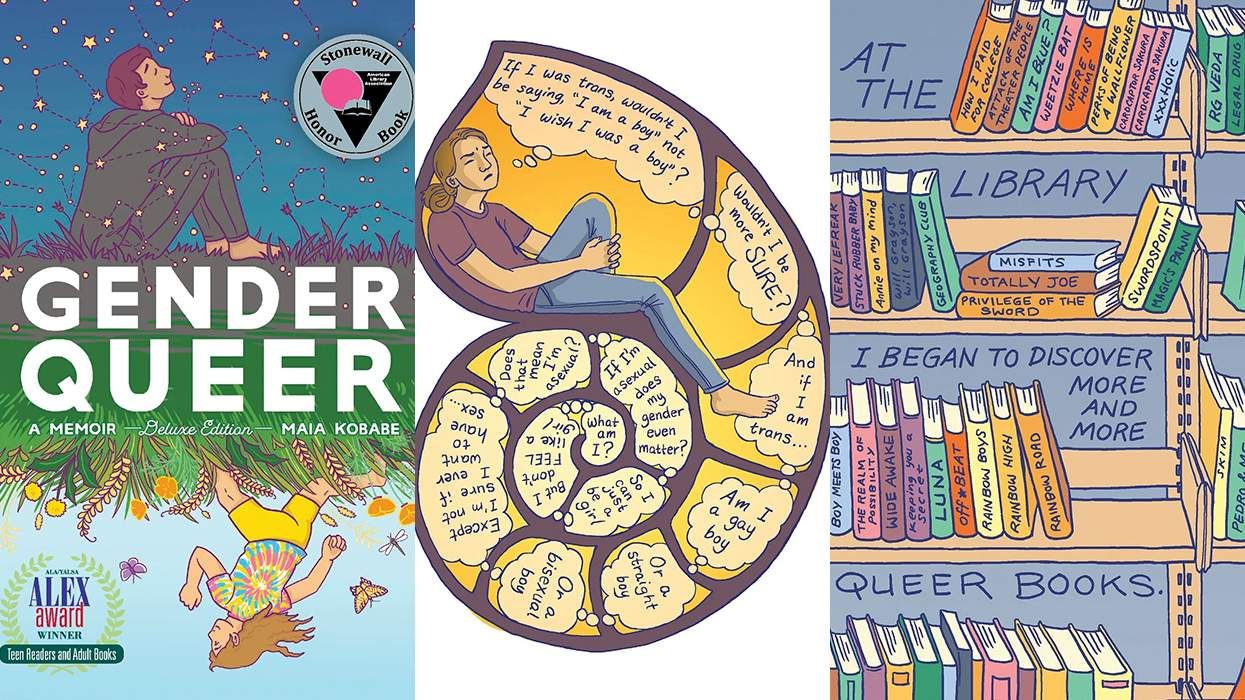The Best Classic LGBTQ+ Novels
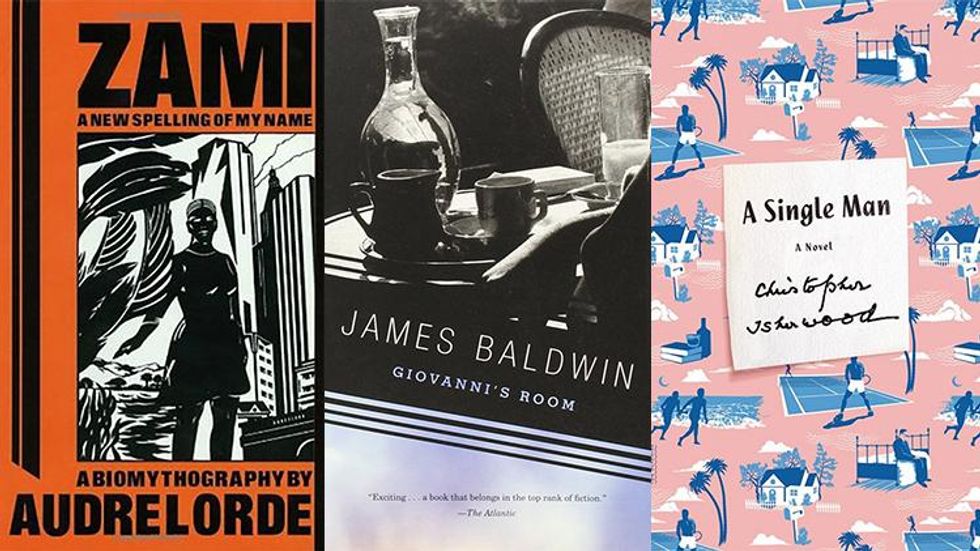
Alan Hollinghurst once claimed the gay novel is dead.
"There was an urgency, a novelty to the whole thing," said the gay author, who won the Man Booker Prize for The Line of Beauty. "And in our culture at least those things are no longer the case."
With all due respect, The Advocate politely disagrees and posits there are plenty of classic gay novels and queer classics to demonstrate that gay literature and the gay novel are alive and well. To that end, we asked past Lambda Literary Award winners about their opinions on classic gay literature, queer classic literature, classic gay books to determine the best gay and queer books of all time. And then our editors added their own recommendations.
Keep scrolling as we reveal our combined recommendations as the best gay and queer books of all time.
“Giovanni’s Room” by James Baldwin (1956)

Author Chavisa Woods is not alone when heralding Giovanni's Room as "masterfully written, heartbreaking." James Baldwin’s book has resonated with many queer folks since first published.
Woods, a Lambda Literary Award nominee for her novel Things to Do When You're Goth in the Country, said Baldwin succeeded at "blurring the lines of hero and villain and bringing the complexity of human nature into horrifying focus."
Perhaps that's because Baldwin said the book is not about being gay.
"Giovanni's Room is not really about homosexuality," Baldwin said in a 1980 interview about queer life. "It's the vehicle through which the book moves. Go Tell It on the Mountain, for example, is not about a church, and Giovanni is not really about homosexuality. It's about what happens to you if you're afraid to love anybody."
“The Color Purple” by Alice Walker (1982)

Alice Walker's novel delves into the intersections of race, gender, family, and sexuality in Jim Crow Georgia circa 1930, causing controversy on the right when it was published.
For all of the painful physical and sexual abuse and heartache protagonist Celie endures at the hands of Mister, the violent man she's forced to marry as an adolescent, she never loses her hope and ultimately seizes her life, identity, and family. At its heart, The Color Purple is a story of love between women: Celie's love for her long-lost sister Nettie and for Shug Avery, the blues singer and Mister’s former lover and with whom she eventually makes a home.
"An epic tale of perseverance and empowerment as well as a celebration of love in all its forms," Tailor-Made author Yolanda Wallac, said of the novel.
Long Shadows author Kate Sherwood said, "I loved how the characters found hope (and love) despite everything standing in their way."
“The Price of Salt” by Patricia Highsmith (1952)

On the heels of her successful debut novel Strangers on a Train, Patricia Highsmith’s chance encounter with a New Jersey socialite while working as a clerk at a department store became the creative seed for The Price of Salt. The result was that rare example of a lesbian-themed novel with a hopeful ending. In a sign of the dangerous times for LGBTQ+ folks, Highsmith's publisher forced her to publish under the pseudonym Claire Morgan as her bold depiction of desire between women that didn’t end tragically could have tanked her career.
SJ Sindu, author of Marriage of a Thousand Lies, called it, "One of the first Anglophone works to challenge the trope of the sad/suicidal gays who die at the end, this book gave us a blueprint of what queer fiction could look like."
The Price of Salt's erotically charged prose telegraphed her signature sense of an ominous "menace" (in this case, the threat of being caught or discovered just as the Cold War’s Red Scare hit the United States). Highsmith went on to write more queer-tinged fiction, including The Talented Mr. Ripley and all of the Ripley novels to follow.
The Price of Salt became the critically acclaimed Todd Haynes-helmed 2015 film Carol, starring Cate Blanchett and Rooney Mara.
“Orlando” by Virginia Woolf (1928)

Virginia Woolf penned Orlando, a study in gender fluidity across time and space, in tribute to friend and lover Vita Sackbville-West.
The eponymous protagonist starts as a rakish young nobleman in Elizabethan England, finding favor with the queen, but the relationship falters and he turns instead to promiscuous relations with a variety of women and an intense friendship with a male poet. Orlando is later sent on a diplomatic mission to Constantinople, where he finds he's become a woman. The gender switch offers an opportunity for commentary on the limitations society places on women.
The book ends in 1928, the year women won full voting rights in England with the passage of the Representation of the People (Equal Franchise) Act, with Orlando still a woman but now with a husband, children, and a new sense of possibility. And living over 300 years, Orlando ages only 36. Tilda Swinton and Quentin Crisp starred in the well-received 1992 film version, directed by Sally Potter.
“Maurice” by E.M. Forster (1971)

Author E.M. Forster (A Passage to India, A Room With a View, Howards End) wrote the benchmark gay novel Maurice circa 1913, but it was only published posthumously in 1971. A note found on Forster's manuscript for Maurice, which was discovered tucked in a drawer, read "Publishable, but worth it?"
In a lush tale of manners, position, and desire, the titular character Maurice meets and falls for classmate Clive while at Oxford. The pair embark on a two-year affair, but Clive eventually leaves Maurice to marry a woman and live as a landed gentry, leaving Maurice in shambles and seeking a cure for his homosexuality. Thankfully, Forster's novel does not end in gay tragedy. Maurice falls in love with another man, Alec Scudder, and abandons his station so that they can be together.
The author of Night Drop, Marshall Thornton called the novel "the original gay romance." Ismail Merchant and James Ivory adapted the novel to the big screen in a gorgeous film starring James Wilby, Hugh Grant, and Rupert Graves.
But Forster's novel does not end in gay tragedy. Maurice falls in love with another man, Alec Scudder, and finally abandons his station so that they can be together. The author of Night Drop, Marshall Thornton called the novel "the original gay romance." A note found on Forster's manuscript for Maurice, which was discovered tucked in a drawer, read "Publishable, but worth it?" Ismail Merchant and James Ivory adapted the novel to the big screen in a gorgeous film starring James Wilby, Hugh Grant, and Rupert Graves.
“Middlesex” by Jeffrey Eugenides (2002)

Inspired by the 19th-century memoirs of Herculine Barbin, Middlesex by Jeffrey Eugenides is an intersex coming-of-age story that incorporates both elements of Greek mythology as well as the author’s Greek-American upbringing.
While Middlesex has received some criticism from the intersex community — the author does not identify as intersex, nor did he consult with those who do — the novel is undoubtedly a landmark in queer visibility. Eugenides won the Pulitzer Prize and is considered a candidate for the title of the Great American Novel by many in literary circles.
“The Line of Beauty” by Alan Hollinghurst (2004)

”The Line of Beauty, Alan Hollinghurst's breakthrough novel, is celebrated for its eloquent prose and vivid depiction of 1980s British high society and conservative politics. It was the winner of the 2004 Man Booker Prize for fiction, and Night Drop's Marshall Thornton commends the novel for "capturing a vitally important era in lovely prose."
In the novel, Hollinghurst aimed his pen directly at the sexual hypocrisies of homophobic politicians, many of whom had their own indiscretions behind closed doors. The book follows Nick Guest, a gay graduate student unofficially adopted by the family of a schoolmate. Nick gets a sneak peek at the aristocracy, while indulging in no shortage of sex and party favors; the fun comes to a crashing halt as the HIV/AIDS epidemic overtook the community. Amid the human drama, there's an amusing and memorable cameo from the Iron Lady, Margaret Thatcher, herself.
“Rubyfruit Jungle” by Rita Mae (1973)

Semi-autobiographical, Rita Mae’s Rubyfruit Jungle follows Molly Bolt's amorous adventures from childhood to adulthood, with a stint in swinging NYC.
Molly has sexual adventures with men, but her true love is women and Brown never shies from describing Molly's insatiable sapphic passions (the title alone suggests Molly's zeal for a certain part of the female anatomy). Even now the frank discussion of lesbian sexuality can seem shocking to readers who imagine life in the early 1970s was less raunchy. Rubyfruit Jungle is a brazen, page-turning reminder that queer lust and queer sex are timeless.
Assigned reading in many queer literature courses, the coming-of-age book is an iconic work of LGBTQ+ literature.
"[I love Rubyfruit Jungle] because, well, because. I think this was the first 'lesbian' book I ever read! And devoured. And loved," writes The Year of Needy Girls' Patricia Smith.
Yolanda Wallace, author of Tailor-Made, tells us, "When I was a teenager questioning my sexuality, this book provided the answers I was looking for."
“Zami” by Audre Lorde (1982)

Zami, the autobiography by the iconic queer black poet Audre Lorde, is an experience of intersectionality, in a genre of intersections. Lorde classified it as biomythography, which combines history, biography, and myth.
"She calls it a biomythography and leads us through a heart-wrenching account of the black lesbian experience," says SJ Sindu, Lambda Literary Award for Lesbian Fiction Winner.
A fierce love letter celebrating the strength women have provided throughout her upbringing, Zami explores the challenge of growing up blind in 1930s Harlem, fighting for dignity in the heat of Jim Crow, and finding a voice in the NYC lesbian bar scene.
While books like The Price of Salt show lesbians walking away from motherhood, Zami celebrates the beauty of when mothers stay through the harshest of challenges.
“A Single Man” by Christopher Isherwood (1962)

A Single Man by Christopher Isherwood is a short novel – just under 200 pages – yet that’s all the space Isherwood needs for his quietly devastating exploration of love, loneliness, and the crushing weight of adult responsibilities.
The story follows the experiences of George, an aging college professor in Los Angeles. Wracked with depression over the loss of his partner in a car accident, George matter-of-factly plots his suicide only to find life gets in the way of his planned demise. After meeting others who are similarly suffering, George has a change of heart. But a last-minute twist changes everything.
While Tom Ford's 2009 film adaptation conveys the styles and anxieties of the early 1960s, it doesn't capture the beautiful tone of despondency created by the incomparable Isherwood.
“The City and the Pillar” by Gore Vidal (1948)

The City and the Pillar by Gore Vidal shocked America when it was released. The queer coming-of-age novel about Jim Willard and his search for love was the first novel from a respected writer that speaks directly and sympathetically about the gay experience in an era when homosexuality was still very much taboo. The book is remembered today for this legacy as well as for various themes — Hollywood's glass closet, being gay in the military, the poisonous effects of homophobia on society — that still reverberate today.
“The Picture of Dorian Gray” by Oscar Wilde (1891)

Oscar Wilde’s only novel might not be overtly gay, but The Picture of Dorian Gray has as much gay subtext for the careful reader that the popular author could get away with during the Victorian Era.
Dorian's friends Basil Hallward and Lord Henry Wotton express intense admiration for his beauty, and passages that show Basil's feelings for Dorian as more clearly homoerotic were excised by an editor, according to Nicholas Frankel, who edited an edition presenting Wilde's original text in 2011.
Despite the edits, the original printing shows Dorian's corruption of both young women and young men.
"There was that wretched boy in the Guards who committed suicide. You were his great friend," Basil tells Dorian at one point. "There was Sir Henry Ashton, who had to leave England, with a tarnished name. You and he were inseparable."
At the Wilde trials in 1895, the opposing attorneys read aloud from Dorian Gray, calling it a 'sodomitical' book." And Alex Ross wrote in The New Yorker in 2011 that "Wilde went to prison not because he loved young men but because he flaunted that love, and Dorian Gray became the chief exhibit of his shamelessness."
“City of Night” by John Rechy (1963)

City of Night is the debut novel by writer, professor, and activist John Rechy who drew on his experiences as a sex worker for this novel that follows the life of a gay hustler in New York City, Los Angeles, New Orleans, and San Francisco.
Rechy broke accepted literary norms of the time by using a stream-of-consciousness narration and gritty, graphic descriptions of sex acts and life on the streets. Rechy even writes of his participation in the 1959 Cooper Do-nuts riots in Los Angeles, where gay men, trans women, drag queens, and others threw donuts and fought back when police tried to arrest three patrons.
The book has inspired the Doors to make repetitive use of “city of night” in their classic song, “L.A. Woman.” Gus Van Sant credited the novel for providing the inspiration for penning My Own Private Idaho.
“Stone Butch Blues” by Leslie Feinberg (1993)

Leslie Feinberg's Stone Butch Blues had an immediate impact on LGBTQ+ literature. The story about a stone butch working-class lesbian was a 1994 Lambda Literary Award finalist and winner of the 1994 American Library Association Gay & Lesbian Book Award (now known as the Stonewall Book Award).
The story is both bleak and hopeful as it follows protagnist Jess Goldberg from her experiences spending weeks in a psychiatric institution as a child, through repeated acts of abuse, rape, and rejection from those who can’t or won’t accept her gender and sexual reality throughout her life, to ultimately finding herself at peace with herself much later in life.
Jess's determination to forge an identity against all odds and Feinberg’s fearless writing cements Stone Butch Blues’s place in queer canon. Feinberg, whose bio reads "writer and transgender activist," would in later years become known more for activism, but the landmark novel about Jess's refusal to fit into a prescribed box for gender is arguably Feinberg's legacy.
“Tales of the City” by Armistead Maupin (1978)

Armistead Maupin’s Tales of the City follows an eclectic group of characters – straight, gay, and trans – and their soap opera stories centering around an apartment complex at 28 Barbary Lane in 1970s San Francisco. The novel broke barriers and humanized the LGBTQ+ community, while also showing affirmational straight characters.
Tales began life in 1974 as serialized stories, first in the alternatively weekly newspaper Pacific Sun and later the San Francisco Chronicle, then grew into the novel, followed by a book series. The Tales franchise chronicles decades of queer life in The City, including the AIDS crisis. Tales of the City was adapted in 1993 into a PBS television miniseries starring Laura Linney and Olympia Dukakis. The pair later reprised their roles for a Netflix adaptation.
“I conceived it by the seat of my pants, in a state of abject panic every morning,” Maupin said of the pressures of writing a weekly serial in an interview with The Guardian in 2014.
“A Boy’s Own Story” by Edmund White (1982)

A Boy's Own Story by Edmund White is comparable to another literary classic, J.D. Salinger's The Catcher in the Rye. The novel is based on White’s experiences as a youth in the Midwestern United States. The story follows the sexual awakening of a 15-year-old boy as he grows and struggles coming to terms with his gay identity..
White would later write two additional novels, The Beautiful Room Is Empty (1988) and The Farewell Symphony (1997), which follow his gay protagonist into young adulthood. Together, they form a poignant trilogy that chronicles a gay life in the latter half of the 20th century.
“Well of Loneliness” by Radclyffe Hall (1928)

British writer Radclyffe Hall's 1928 Well of Loneliness focuses on Stephen Gordon, an upper-class lesbian who dons men's clothing and becomes a novelist. Gordon goes on to become part of a literary salon in Paris at a time when there were no overt laws expressly barring homosexuality.
Hall's novel was groundbreaking by introducing "sexologists" Richard von Krafft-Ebing and Havelock Ellis, who posited that homosexuality was an inborn, unalterable trait that was considered a congenital sexual inversion that simply meant a "difference" and not a defect. Such beliefs were considered heresy in both healthcare and society.
Not too unsurprisingly, the novel was the subject of obscenity charges in the U.K. where the book was deemed obscene and ordered destroyed, and in the U.S., where it was banned.
“Fun Home: A Family Tragicomic” by Allison Bechdel (2006)

You might not expect to see a graphic novel in this list, but iconic cartoonist (and Bechdel test namesake) Alison Bechdel always takes the less traveled road.
Off the success of her comic strip Dykes to Watch Out For, she created the deeply personal Fun Home: A Family Tragicomic, which chronicles her confusing childhood in rural Pennsylvania and dysfunctional relationship with her father through a lesbian lens. The book took seven years to create in Bechdel's laborious artistic process, which included photographing herself in poses that are drawn into each human figure.
This queer exploration of broken family, unraveling emotions, and death by suicide was a New York Times best seller. Fun Home earned nominations for the National Book Critics Circle Award and three Eisner Awards, and became a mainstream critical and commercial success.
The book was adapted into a musical, which was a finalist for the Pulitzer Prize for Drama. When it hit Broadway in 2015, it won the Tony Award for Best Musical.
“Death in Venice” by Thomas Mann (1912)

Thomas Mann’s Death in Venice was considered scandalous when first published, and remains controversial today. Some say the story is nothing more than a tale of inappropriate longing. Others question if it can be considered a gay novel, since there are no overt same-sex sexual encounters, Others consider it brilliant.
German writer Thomas Mann crafted the story based on his own experience in Venice, where he was captivated at the sight of a handsome young man. Is the increasingly obsessed Aschenbach, the 50-something protagonist, merely fixated on beautiful objects, where individuals and centuries-old buildings are of equal lure? Or is his attraction to the youthful Tadzio something more lustful and disturbing?
Despite its touchy subject matter, the novel has remained popular since it was first published. In 1971, Death in Venice was adapted into the classic film of the same name, starring Dirk Bogarde as Aschebach and Björn Johan Andrésen as the frustatingly mysterious Tadzio.
“Under the Udala Trees” by Chinelo Okparantaggg (2015)

Under the Udala Trees by Chinelo Okparantaggg unpacks the emotional life of Ijeoma, a girl displaced by civil war in Nigeria as she begins a gut-wrenching relationship with Amina, a fellow refugee. The two girls are from different ethnic communities, forcing them to face not only the taboos of being queer but the prejudices of surviving in a nation eating itself alive.
"This lyrical book is a wonderful story with a background of a civil war and a love story between two young girls on the frontlines,” gay refugee activist and columnist Danny Ramadan said. “Wonderful book."
"A great recollection of everything anyone would say in Nigeria against homosexuality using the defense of religion," said David Nnanna Ikpo, the Nigerian author of Fimisile Forever.
“Oranges Are Not the Only Fruit” by Jeanette Winterson (1985)
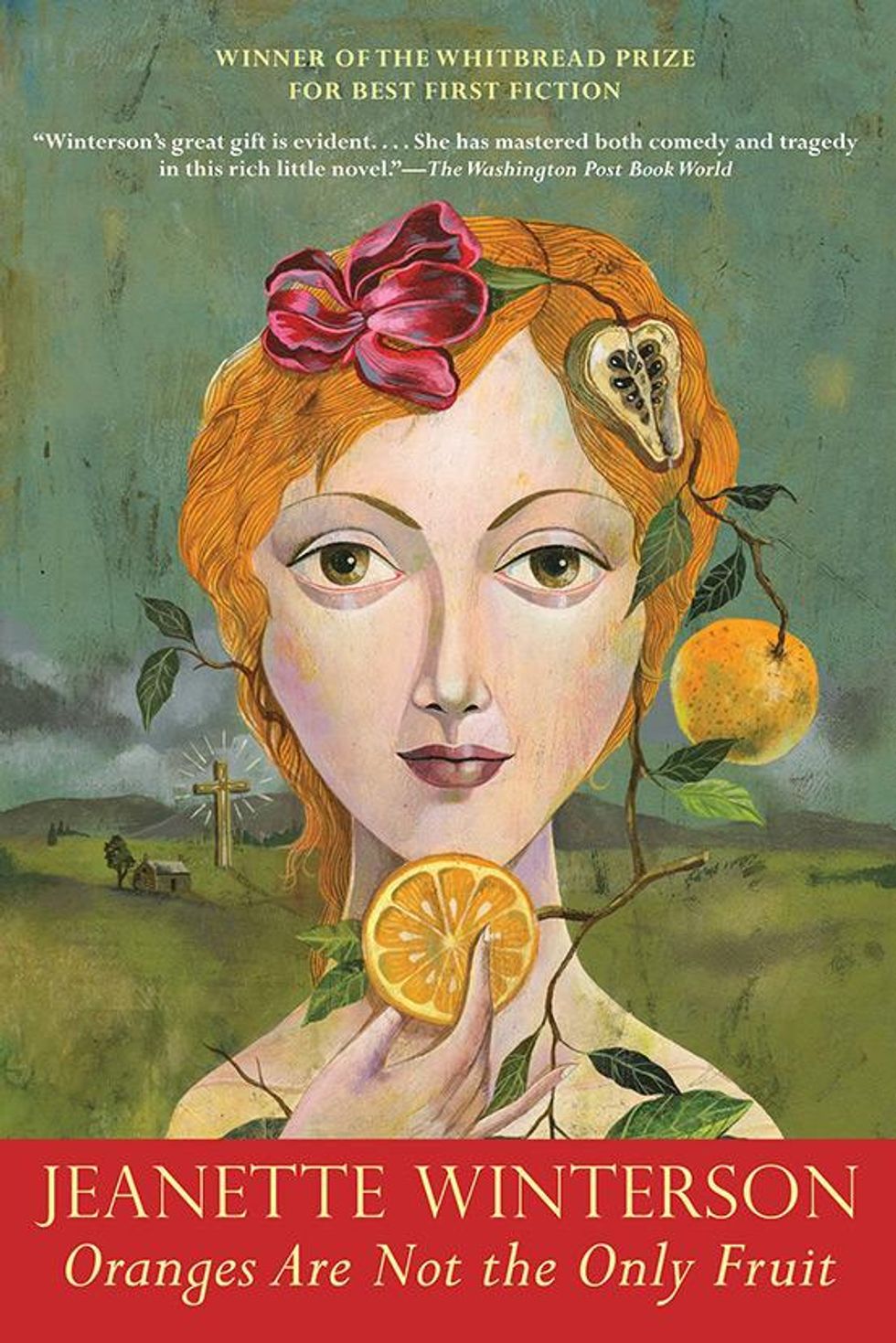
Jeanette Winterson's first novel is a semi-autobiographical coming-of-age story about a girl growing up in a deeply religious family in England's industrial Midlands region.
Protagonist Jeanette's burgeoning lesbian sexuality clashes with the religious zealotry of her Pentecostal church. Quirky and memorable secondary characters further enhance the novel, which made Winterson a literary star overnight, esteemed by both readers and fellow authors.
"A beautiful piece of fiction, this novel takes us through the complicated relationship between religion and LGBTQ+ identity.", says SJ Sindu, the prize-winning author of Marriage of a Thousand Lies.
“The Hours” by Michael Cunningham (1998)

The Hours by Michael Cunningham seamlessly weaves three parallel stories involving queer characters in different times and places.
In England in the 1920s, Virginia Woolf struggles with depression and writing Mrs. Dalloway, a novel to which Cunningham pays homage. In mid-20th-century Los Angeles, housewife Laura Brown, discontented with her life, confronts her attraction to women. And in 1990s New York City, Clarissa Vaughan, who is lesbian, plans a party for her best friend, writer Richard Brown, a gay man dying of AIDS.
The Hours was a critical and popular success, winning both a Pulitzer Prize and the PEN/Faulkner Award. The 2002 film adaptation, written by David Hare and directed by Stephen Daldry, received multiple Oscar nominations, and Nicole Kidman won Best Actress for her portrayal of Woolf. It co-starred Julianne Moore, Meryl Streep, and Ed Harris.
“The Little Life” by Hanya Yanagihara (2015)

The Little Life by Hanya Yanagihara is not a little read, and not just because of its 700-page length.
The novel chronicles three decades in the evolution of friendship and love between four friends — Jude, Malcolm, JB, and Willem — who met in college.The course and ultimate survival of their friendship is described in intensely vulnerable detail. Readers might be blindsided by Yanagihara’s penetrating clarity in revealing what binds friends together or drives them apart.
"We might all have had that feeling,” Yanagihara told The Guardian in 2015. “As a friend, what is my responsibility to save someone who doesn't want to be saved? Or tell someone to keep living when they don't want to live?"
“Tipping the Velvet” by Sarah Waters (1998)

Sarah Waters's Tipping the Velvet is the coming-of-age story of Nan, a Whitstable "oyster girl" circa 1890. While watching a show in her local theater, Nan becomes smitten with the charismatic masher (male impersonator) Kitty. Nan follows Kitty to London, where the more experienced woman schools her in the ways of impersonating a dapper dandy onstage.
The pair fall in love and become the toast of London's music halls as they perform as men together. Heartbreak eventually ensues and Nan is left to her own defenses on the streets in the big city. She dabbles in sex work to survive before becoming the boy-toy for a wealthy older lesbian renowned for throwing Bacchanalian gatherings of women. Nan finally comes into her own, but only after ditching the trappings of her male alter ego.
The book was an immediate smash with queer women for its frank depiction of lesbian desire and of flirting with gender roles. Tipping the Velvet won the Lambda Literary Award and earned a place on the New York Times list of notable books in 1998, and was later adapted into a 2002 BBC miniseries.
"Love the sensuousness of it, the unapologetic portrayal of Nan — the sex scenes," said Patty Smith, author of The Year of Needy Girls.
“F***ts” by Larry Kramer (1978)

Larry Kramer, a founder of ACT UP and the playwright of The Normal Heart, may be known for his vocal AIDS activism. But his novel, F****ts, was also a loud statement that portrayed the hedonism of gay NYC. The book features a cast of dozens of gay men, who variously engage in bathhouse orgies, use a slew of party drugs, and cavort in clubs with names like The Toilet Bowl and Fire Island. The book was condemned by many within the LGBTQ+ community upon its release for what they perceived as sex-negativity. But the ensuing AIDS crisis established F****ts as a bellwether of the storm to come.



